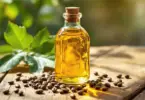Guest writer for Wake Up World
With one out of every 10 American adults actively taking an antidepressant, the need to promote mental health through natural means has never been greater.[1] A healthy, organic diet and regular exercise are critical for laying the foundation of healthy living. Herbs like St. John’s wort (Hypericum perforatum) are a source of antioxidants and other specialized nutrients that encourage physical and mental wellness. In fact, for centuries, people have turned to St. John’s wort as a natural remedy for an array of health concerns. Let’s take a closer look at its history and benefits.
| St. John’s Wort Quick Facts | |
|---|---|
| Scientific Name: | Hypericum perforatum |
| Family: | Hypericaceae |
| Origin: | Europe and Asia |
| Plant Type: | Flowering, Perennial |
| Health Benefits: | Supports Mental Wellness, Women’s Health, and Healthy Skin |
[pro_ad_display_adzone id=”110028″]
History of St. John’s Wort
Because of St. John’s wort’s ability to encourage a pleasant mood, much of its history includes superstition and spirits. The traditional Greek use was to hang the plant over religious paintings and statues to ward off “evil spirits.” Greek herbalists saw other uses for the plant and created tinctures to help with cuts, burns, harmful organisms, and even snakebites.[2]
The mysticism surrounding St. John’s wort carried over to early American settlements where the plant was often sewn into door wreaths to drive away unfriendly spirits. Settlers also believed that the herb would induce a confession if placed in the mouth of a suspected witch.[3] Today, most of the superstition that surrounded the plant is long forgotten and it’s understood that the plant’s ability to influence mood and temperament is owed to its nutritional components.
St. John’s Wort and Depression
St. John’s wort has shown promise in relieving symptoms of depression. Depression can present itself in many different ways and is often described as a persistent feeling of extreme unhappiness. Left unchecked, it can affect sleep, appetite, energy, cognitive function, and even the immune system. Persistent or major depression is typically due to a chemical imbalance in the brain.
Selective serotonin reuptake inhibitors (SSRIs) are one of the most commonly prescribed antidepressants. They work by targeting serotonin, an important neurotransmitter that affects mood. SSRIs increase serotonin levels by blocking serotonin absorption in the brain. In theory, this can increase the amount of available serotonin and strengthen the part of the nervous system that regulates mood. Unlike a SSRI, St. John’s wort inhibits the reuptake, or absorption, of all neurotransmitters including monoamines, dopamine, and noradrenaline, and the amino-acid neurotransmitters GABA and glutamate.[4]
Nearly 30 international studies report that St. John’s wort works better than placebo for those experiencing mild to moderate depression. However, other studies found it less effective at addressing more severe kinds of depression. More research may bring clarity. In the meantime, many doctors in Germany recommend St. John’s wort to patients who experience mild to moderate depression.[5]
St. John’s Wort and PMS
Over 80% of women in the United States have experienced premenstrual syndrome (PMS).[6] Common symptoms of PMS include headaches, bloating, and fatigue. Women who suffer from more severe symptoms may have premenstrual dysphoric disorder (PMDD). Symptoms of PMDD include depression, mood swings, and anxiety. One double-blind, placebo-controlled trial found that St. John’s wort was effective at positively influencing physical and behavioral symptoms associated with PMS. More severe symptoms such as anxiety, depression, aggression, and impulsivity remained unchanged following St. John’s wort supplementation. More research is needed to determine if long-term supplementation is useful for PMS or PMDD symptoms.[7]
St. John’s Wort and Menopause
Menopause is associated with a natural decrease in reproductive hormones in women around ages 48 to 55. The symptoms of menopause include hot flashes, sleep disruption, moodiness, and a reduced sex drive. St. John’s wort could help address several of these symptoms. One randomized, double-blind, placebo-controlled study of 100 women reported a decrease in the severity, frequency, and duration of hot flashes after taking St. John’s wort extract daily for eight weeks.[8] Another study involving 111 women ages 43 to 65 reported improvements in sexual well-being after taking St. John’s wort extract.[9]
Other Benefits of St. John’s Wort
St. John’s wort has been evaluated against anxiety, stress, seasonal affective disorder (SAD), and obsessive-compulsive disorder (OCD). Early results show promise, but more research is necessary to verify effectiveness. However, at least one study noted that the antioxidant properties alone in St. John’s wort could make it an effective neuroprotective agent.[10]
In one study, over the course of a month, St. John’s wort helped to heal the wounds of ICU patients.[11] The plant’s soothing action and resistance to harmful organisms[12] is a possible explanation for its ability to encourage healthy skin.
Supplements and Tea
You can find St. John’s wort in a variety of forms, including pills, powders, and liquids. While carefully measured extracts assure potency, you can also make tea with the fresh flowers from the plant. St. John’s wort tea is easy to make; simply steep a handful of flowers in hot water for four minutes and strain.
Side Effects and Precautions
St. John’s wort can interact with prescription medications; it can reduce the effectiveness of birth control pills, heart medication, and even some HIV and cancer drugs.[5] Establishing a standard serving is also a concern when using St. John’s wort. Side effects are rare but do occur. These include dry mouth, upset stomach, increased sensitivity to light, and increased feelings of anxiety. Like any supplement, use by pregnant or nursing women and children is not recommended without clear instruction from your personal, trusted health care advisor.
Alternative Approaches to Mental Health
There are many natural alternatives to support mental wellness. Nutritional approaches to mental health can have a huge impact on how you look and feel. Consuming the right food that is whole, organic, and nutritious supports a positive mental state. Daily exercise, like yoga or walking, is extremely effective at encouraging physical and mental health.[13] No matter your physical shape, adequate sleep and daily meditation can work wonders for relieving feelings of anxiety, boosting mood, and clearing the mind.[14]
What do you do to support mental wellness? Have you tried St. John’s wort? Tell us about your experiences in the comment section below.
References:
- “Antidepressant Use in Persons Aged 12 and Over: United States, 2005–2008.” Centers for Disease Control and Prevention. Centers for Disease Control and Prevention, 19 Oct. 2011. Web. 02 Feb. 2017.
- Klemow, K.M., Bartlow, A., Crawford, J., et al. “Medical Attributes of St. John’s Wort (Hypericum perforatum).” Herbal Medicine: Biomolecular and Clinical Aspects. 2nd edition. 2011
- Patterson, Rachel. “A Kitchen Witch’s World of Magical Plants & Herbs.” Winchester, UK: Moon, 2014.
- Nathan, P.J. “Hypericum perforatum (St John’s Wort): a non-selective reuptake inhibitor? A review of the recent advances in its pharmacology.” J Psychopharmacol (Oxford). 2001;15(1):47-54.
- “St. John’s Wort and Depression: In Depth.” National Institutes of Health. U.S. Department of Health and Human Services, 05 May 2016. Web. 02 Feb. 2017.
- “Premenstrual Syndrome (PMS).” Premenstrual Syndrome (PMS) : Statistics | Florida Hospital. N.p., n.d. Web. 02 Feb. 2017.
- Canning, S., Waterman, M., Orsi, N., Ayres J., Simpson N., Dye L. “The efficacy of Hypericum perforatum (St John’s wort) for the treatment of premenstrual syndrome: a randomized, double-blind, placebo-controlled trial.” CNS Drugs. 2010;24(3):207-25.
- Abdali, K., Khajehei, M., Tabatabaee, H.R. “Effect of St John’s wort on severity, frequency, and duration of hot flashes in premenopausal, perimenopausal and postmenopausal women: a randomized, double-blind, placebo-controlled study.” Menopause. 2010;17(2):326-31.
- Grube, B., Walper, A., Wheatley, D. “St. John’s Wort extract: efficacy for menopausal symptoms of psychological origin.” Adv Ther. 1999;16(4):177-86.
- Oliveira, A.I., Pinho, C., Sarmento, B., Dias, A.C. “Neuroprotective Activity of Hypericum perforatum and Its Major Components.” Front Plant Sci. 2016;7:1004.
- Yücel, A., Kan, Y., Yesilada, E., Ak?n, O. “Effect of St.John’s wort (Hypericum perforatum) oily extract for the care and treatment of pressure sores; a case report.” J Ethnopharmacol. 2017;196:236-241.
- Hou, W., Shakya, P., Franklin, G. “A Perspective on Hypericum perforatum Genetic Transformation.” Front Plant Sci. 2016;7:879.
- Sharma, A., et al. “Exercise for Mental Health.” The Primary Care Companion to the Journal of Clinical Psychiatry. 8 (2).
- Goyal, M., et al. “Meditation Programs for Psychological Stress and Well-being.” JAMA Internal Medicine. 174 (3).
Recommended articles by Dr. Edward Group:
- The 9 Best Fermented Foods for Your Gut
- 14 Foods that Cleanse the Liver
- Top 5 Foods for the Pineal Gland
- 6 Things You Must Know About Colloidal Silver
- The Importance of a Kidney Cleansing Diet
- The 9 Best Herbs for Lung Cleansing and Respiratory Support
- 7 Best Foods to Support Kidney Function
- Lung Cleansing With Peppermint Oil
- 20 Health Benefits of Fasting for Whole Body Wellness
- How Fluoride Damages Pineal Gland Health
- How Does the Alkaline Diet Affect Gut Health?
- The Stages of Fasting: What Happens to Your Body When You Fast?
About the author:
 Dr. Edward F. Group III (DC, ND, DACBN, DCBCN, DABFM) founded Global Healing Center in 1998 and is currently the Chief Executive Officer. Heading up the research and development team, Dr. Group assumes a hands-on approach in producing new and advanced degenerative disease products and information.
Dr. Edward F. Group III (DC, ND, DACBN, DCBCN, DABFM) founded Global Healing Center in 1998 and is currently the Chief Executive Officer. Heading up the research and development team, Dr. Group assumes a hands-on approach in producing new and advanced degenerative disease products and information.
Dr. Group has studied natural healing methods for over 20 years and now teaches individuals and practitioners all around the world. He no longer sees patients but solely concentrates on spreading the word of health and wellness to the global community. Under his leadership, Global Healing Center, Inc. has earned recognition as one of the largest alternative, natural and organic health resources on the internet.
For more information, please visit Global Healing Center.
[pro_ad_display_adzone id=”110027″]







